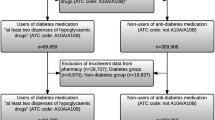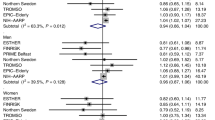Abstract
Objective
To determine whether accounting for the time dynamics of diabetes exposure will change the risk estimates for colorectal cancer.
Methods
We analyzed data from the 45, 516 women enrolled in the BCDDP follow-up cohort study. We used proportional hazards regression to obtain multivariable-adjusted risk estimates for incident colorectal cancer for prevalent diabetes at baseline and diabetes as a time-dependent variable.
Results
Subjects with diabetes had a statistically significant increased risk of colorectal cancer compared to subjects without diabetes (RR = 1.60, 95% CI 1.18–2.18). When we defined exposure as duration of diabetes exposure at cohort exit, we found that in the first 4 years after diagnosis risk was essentially the same as in those never having had a diagnosis of diabetes. For those who had been diagnosed between 4 and 8 years previously, however, we observed a RR of 2.36 (95% CI 0.96–5.79), while longer duration of exposure was associated with smaller and then no change in risk compared to those without a diagnosis of diabetes.
Conclusions
These results are consistent with the theory that hyperinsulinemia can explain, at least in part, the association of diabetes with colorectal cancer, but in a time-dependent manner.
Similar content being viewed by others
References
Giovannucci E (1995) Insulin and colon cancer. Cancer Causes Control 6:164–179
McKeown-Eyssen G (1994) Epidemiology of colorectal cancer revisited: are serum triglycerides and/or plasma glucose associated with risk? Cancer Epidemiol Biomark Prev 3(8):687–695
Giovannucci E (2001) Insulin, insulin-like growth factors and colon cancer: a review of the evidence. JNutr 131(11):3109S–3120S
Kaaks R (2002) Nutrition, energy balance and colon cancer risk: the role of insulin and insulin-like growth factor-I. IARC Sci Publ 156:289–293
Sandhu MS, Dunger DB, Giovannucci EL (2002) Insulin, insulin-like growth factor-I (IGF-I), IGF binding proteins, their biologic interactions, and colorectal cancer. J Natl Cancer Inst 94(13):972–980
American Institute for Cancer Research (1997) Food, nutrition and the prevention of cancer: a global perspective. American Institute for Cancer Research, Washington
Ahmed RL, Schmitz KH, Anderson KE, Rosamond WD, Folsom AR (2006) The metabolic syndrome and risk of incident colorectal cancer. Cancer 107(1):28–36
Colangelo LA, Gapstur SM, Gann PH, Dyer AR, Liu K (2002) Colorectal cancer mortality and factors related to the insulin resistance syndrome. Cancer Epidemiol Biomark Prev 11(4):385–391
Coughlin SS, Calle EE, Teras LR, Petrelli J, Thun MJ (2004) Diabetes mellitus as a predictor of cancer mortality in a large cohort of US adults. Am J Epidemiol 159(12):1160–1167
Hu FB, Manson JE, Liu S, Hunter D, Colditz GA, Michels KB et al (1999) Prospective study of adult onset diabetes mellitus (type 2) and risk of colorectal cancer in women. J Natl Cancer Inst 91(6):542–547
Inoue M, Iwasaki M, Otani T, Sasazuki S, Noda M, Tsugane S (2006) Diabetes mellitus and the risk of cancer: results from a large-scale population-based cohort study in Japan. Arch Intern Med 166(17):1871–1877
Jee SH, Ohrr H, Sull JW, Yun JE, Ji M, Samet JM (2005) Fasting serum glucose level and cancer risk in Korean men and women. Jama 293(2):194–202
Khaw KT, Wareham N, Bingham S, Luben R, Welch A, Day N (2004) Preliminary communication: glycated hemoglobin, diabetes, and incident colorectal cancer in men and women: a prospective analysis from the European prospective investigation into cancer-Norfolk study. Cancer Epidemiol Biomarkers Prev 13(6):915–919
Limburg PJ, Anderson KE, Johnson TW, Jacobs DR Jr, Lazovich D, Hong CP et al (2005) Diabetes mellitus and subsite-specific colorectal cancer risks in the Iowa women’s health study. Cancer Epidemiol Biomark Prev 14(1):133–137
Nilsen TI, Vatten LJ (2001) Prospective study of colorectal cancer risk and physical activity, diabetes, blood glucose and BMI: exploring the hyperinsulinaemia hypothesis. Br J Cancer 84(3):417–422
Saydah SH, Platz EA, Rifai N, Pollak MN, Brancati FL, Helzlsouer KJ (2003) Association of markers of insulin and glucose control with subsequent colorectal cancer risk. Cancer Epidemiol Biomark Prev 12(5):412–418
Schoen RE, Tangen CM, Kuller LH, Burke GL, Cushman M, Tracy RP et al (1999) Increased blood glucose and insulin, body size, and incident colorectal cancer. J Natl Cancer Inst 91(13):1147–1154
Weiderpass E, Gridley G, Nyren O, Ekbom A, Persson I, Adami HO (1997) Diabetes mellitus and risk of large bowel cancer. J Natl Cancer Inst 89(9):660–661
Will JC, Galuska DA, Vinicor F, Calle EE (1998) Colorectal cancer: another complication of diabetes mellitus? Am J Epidemiol 147(816):825
Larsson SC, Giovannucci E, Wolk A (2005) Diabetes and colorectal cancer incidence in the cohort of Swedish men. Diabetes Care 28(7):1805–1807
Seow A, Yuan JM, Koh WP, Lee HP, Yu MC (2006) Diabetes mellitus and risk of colorectal cancer in the Singapore Chinese health study. J Natl Cancer Inst 98(2):135–138
Limburg PJ, Vierkant RA, Fredericksen ZS, Leibson CL, Rizza RA, Gupta AK et al (2006) Clinically confirmed type 2 diabetes mellitus and colorectal cancer risk: a population-based, retrospective cohort study. Am J Gastroenterol 101(8):1872–1879
Sturmer T, Buring JE, Lee IM, Gaziano JM, Glynn RJ (2006) Metabolic abnormalities and risk for colorectal cancer in the physicians’ health study. Cancer Epidemiol Biomark Prev 15(12):2391–2397
Kasper JS, Liu Y, Pollak MN, Rifai N, Giovannucci E (2008) Hormonal profile of diabetic men and the potential link to prostate cancer. Cancer Causes Control 19(7):703–710
Flood A, Velie EM, Chaterjee N, Subar AF, Thompson FE, Lacey JV Jr et al (2002) Fruit and vegetable intakes and the risk of colorectal cancer in the breast cancer detection demonstration project follow-up cohort. Am J Clin Nutr 75(5):936–943
Ainsworth BE, Haskell WL, Whitt MC, Irwin ML, Swartz AM, Strath SJ et al (2000) Compendium of physical activities: an update of activity codes and MET intensities. Med Sci Sports Exerc 32(9):S498–S516
Willett W (1990) Nutritional epidemiology. Oxford University Press, New York
Flood A, Mai V, Pfeiffer R, Kahle L, Remaley AT, Lanza E et al (2007) Elevated serum concentrations of insulin and glucose increase risk of recurrent colorectal adenomas. Gastroenterology 133(5):1423–1429
Limburg PJ, Stolzenberg-Solomon RZ, Vierkant RA, Roberts K, Sellers TA, Taylor PR et al (2006) Insulin, glucose, insulin resistance, and incident colorectal cancer in male smokers. Clin Gastroenterol Hepatol 4(12):1514–1521
Giovannucci E (2007) Metabolic syndrome, hyperinsulinemia, and colon cancer: a review. Am J Clin Nutr 86(3):s836–s842
Yang YX, Hennessy S, Lewis JD (2004) Insulin therapy and colorectal cancer risk among type 2 diabetes mellitus patients. Gastroenterology 127(4):1044–1050
John BJ, Irukulla S, Abulafi AM, Kumar D, Mendall MA (2006) Systematic review: adipose tissue, obesity and gastrointestinal diseases. Aliment Pharmacol Ther 23(11):1511–1523
Acknowledgments
The authors would like to thank Leslie Carroll at IMS, Inc., Silver Spring, MD for computer support and Cathy Ann Grundmayer, Susan Englehart, and the BCDDP staff of Westat, Inc., Rockville, MD for assistance in collecting and processing data for the study. The authors wish to acknowledge the California Department of Health Services, Cancer Surveillance Section; the Florida Cancer Data System under contract to the state Department of Health; the Maryland Cancer Registry, Maryland Department of Health and Mental Hygiene; the Michigan Cancer Surveillance Program within the Division for Vital Records and Health Statistics, Michigan Department of Community Health; the Division of Health Statistics, Pennsylvania Department of Health; the Tennessee Cancer Registry; the Texas Department of Health; and the states of Arizona, Georgia, Hawaii, Idaho, Iowa, New Jersey, New York, North Carolina, Ohio, Oregon, and Rhode Island for providing data from their cancer registries for use in these analyses.
Financial support
Funding for this work was provided by National Institutes of Health (K07 CA108910-01A1 to A.F.) and Intramural Research Program funds from the National Cancer Institute, Bethesda, MD.
Author information
Authors and Affiliations
Corresponding author
Rights and permissions
About this article
Cite this article
Flood, A., Strayer, L., Schairer, C. et al. Diabetes and risk of incident colorectal cancer in a prospective cohort of women. Cancer Causes Control 21, 1277–1284 (2010). https://doi.org/10.1007/s10552-010-9555-0
Received:
Accepted:
Published:
Issue Date:
DOI: https://doi.org/10.1007/s10552-010-9555-0




